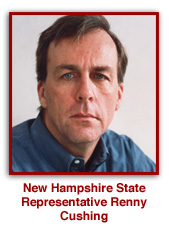
When a murder goes unsolved, the victim’s family is left with only their imaginations of what might have happened. There are no answers and certainly no justice. That is why New Hampshire state representative Renny Cushing supported a law establishing the state’s first Cold Case Unit dedicated exclusively to investigating unsolved murders.
“When they reopen an investigation, they start by re-interviewing the family members. This can trigger trauma memories. Like anyone else, they would want to speak to a mental health professional around this time,” said Rep. Cushing. But a statute of limitations on requests for victims’ compensation meant that if the crime happened more than two years ago, families who couldn’t afford to pay for counseling were out of luck.
So Rep. Cushing sponsored a bill, which became law this September, eliminating the time limits on victims’ compensation. It is the first time in the country that cold case victims are recognized under victims’ compensation statutes.
The new law also raises the amount of compensation available and extends eligibility to families of missing persons, when a homicide is presumed. All these families can now draw support for counseling, lost wages, travel to attend trials, and other expenses.
Rep. Cushing’s own father was murdered in 1988 and since that time he has devoted his energies to changing the criminal justice system. He wants to see the false promise of the death penalty ended and real support for victims’ families in its place. He is proud that New Hampshire is leading the country on new ways of meeting the needs of victims of crime. And, with a promising repeal campaign in New Hampshire just around the corner, the state might soon lead the country in other ways as well.


